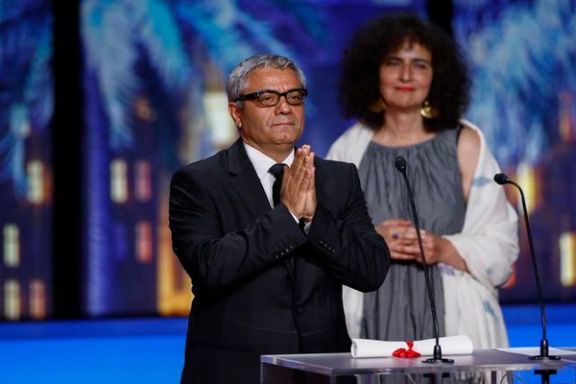Rasoulof who recently fled Iran after getting an eight-year jail term, won the prestigious festival's Special Award for Best Screenplay during a Friday ceremony for his latest film "The Seed of the Sacred Fig".
After receiving the award, Rasoulof said, "I am very happy for this award, and at the same time, my heart is with the people of Iran who wake up every day, every hour, and every morning to a disaster."
He added, "The people of Iran have been taken hostage."
Rasoulof also spoke about many dissident artists and writers that he said suffer under the rule of a “tyrannical and oppressive regime.”
Referring to political prisoners in Iran, he mentioned the young dissident rapper, Toomaj Salehi, who has been sentenced to death.
The dissident filmmaker fled the country by foot through rugged mountainous terrain after years of intimidation and the confiscation of his passport.
Before leaving the country, he had received a harsh sentence that included eight years in jail, flogging, fine, and property confiscation for “the signing of statements and making of films and documentaries,” which the Islamic Republic claims are “collusion to commit a crime against the country's security.”
After leaving Iran Rasoulof, in a post on the social media platform Instagram, described the pressure exerted on him by Iranian security agencies over the recent years. He mentioned that friends, acquaintances, and other individuals helped him leave Iran.
In an interview with Iran International on the sidelines of the Cannes Festival, Rasoulof elaborated on the main themes of his film which focuses on "an investigating judge in the Revolutionary Court in Tehran who grapples with mistrust and paranoia as nationwide political protests intensify and his gun mysteriously disappears."
"I think the main issue is ‘devotion’. My main goal was to follow and see how this system [of the Islamic Republic] works. Who enters this structure and participates?"
He added that, based on his lived experience of “facing the judge, interrogator, investigator, etc.,” these people are mere "devotees" who have "entrusted their head to another place," with decisions being made by someone else.
Rasoulof further emphasized that the concept of ‘devotion’ is heavily symbolized within the Islamic Republic. He pointed to the role models promoted by state propaganda and added that within such a government, there are individuals who, with arms crossed over their chests, preach surrender and devotion.
Referring to the oath that judges in Iran are required to take, which is also referenced in the film, Rasoulof said, "It is very strange that at the end of the judges' oath, they are asked to be loyal to the Islamic Republic and support the leader. It is very strange that justice and human commitment become victims of such a requirement."
He added that such an oath can only be expected from the Islamic Republic, emphasizing that it is characteristic of this government to create such an oath.
Moreoever, Setareh Maleki, one of the film’s actresses, who had to leave Iran along with Rasoulof to attend the Cannes Film Festival, told Iran International, "The conditions for making the film were very, very difficult."
She added, "It was harder than you can imagine. Our group was small, about 30 people, to maintain security. This made the work much harder for everyone because each person had to do the work of several people."
The actress continued, "The working conditions were full of stress and pressure. Everyone was constantly waiting for something to happen. At night, in our accommodation, we thought this could be the night when they come and arrest everyone."








